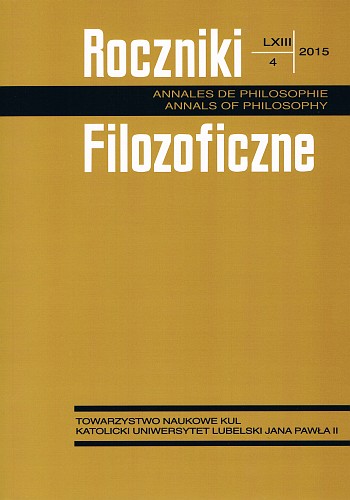Oświeceniowa kultura naukowa w kontekście filozoficznym. Z dziejów Komisji Edukacji Narodowej (cz. 2)
Learned Culture in the Enlightenment in the Philosophical Context: On the History of the Commission of National Education (Part Two)
Author(s): Stanisław JaneczekSubject(s): Philosophy
Published by: Towarzystwo Naukowe KUL & Katolicki Uniwersytet Lubelski Jana Pawła II
Keywords: Commission of National Education;Polish-Lithuanian Commonwealth;Age of Enlightenment;History of Education;History of Philosophy;History of Science;
Summary/Abstract: The paper depicts the didactic approach of the Commission of National Education (Pol. KEN). It shows curricula policy, textbooks, and didactic practice against the backdrop of reforms characteristic of the then European school. In presenting the reality of learned culture in education managed by the Commission attention is focused on the specific borderline between philosophy and modern science, the areas that many a time diverged from contemporary circumstances.Teaching in the KEN schools undoubtedly belongs to the policy of eclectic intellectual culture of the Enlightenment that seeks to reconciliate the traditional school with modern postulates. This attitude was manifested throughout European education, therefore not only in France, which was leading at least in her policy declarations, but especially in the Habsburg monarchy whose education was under centralistic reformation. It was also proper to the then learned culture of the Encyclopaedia, or a Systematic Dictionary of the Sciences, Arts, and Crafts, on which the KEN would directly draw. The KEN schools diverge from the identification real education with a course of philosophy, a fact became more prominent together with the popularisation of empiristic epistemology that resulted in phenomenalism; the latter eliminated the approach founded on philosophy in the traditional school, the approach proper to modern Christian Aristotelianism. The European school of linguistic and humanistic studies was enriched by mathematics and natural sciences, whereas a course in philosophy in the spirit of philosophia recentiorum was maintained, at least at the university level. This philosophy assimilated some elements of modern epistemology in a critical manner, especially the accomplishments of modern natural science. Such attitude was also characteristic of the school reformed in the mid-eighteenth century in the Polish-Lithuanian Commonwealth, especially by the Piarists and Jesuits. The KEN introduced independent mathematical and natural science subjects, a fact that resulted in limitation of the course of philosophy which in secondary education was reduced to a course in logic and practical ethics, and at universities to natural law with some social, political, and economic references. This resulted in departure from the traditional structure of university, with a propaedeutic faculty of philosophy, where a two-part structure of higher education was constituted in the spirit of physiocratic physical order and moral order. Nevertheless the pressure of the so-called long duration (longue durée) accounts for the maintenance of philosophical elements in Enlightenment school, even in natural science, in the form of interpretation that takes advantage of the category of substance and its properties, and even of the conception of animal soul.
Journal: Roczniki Filozoficzne
- Issue Year: 63/2015
- Issue No: 4
- Page Range: 67-114
- Page Count: 48
- Language: Polish

